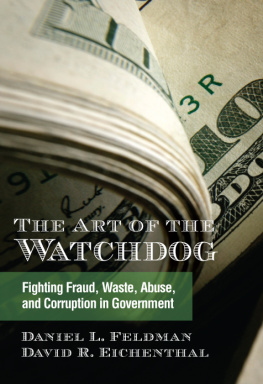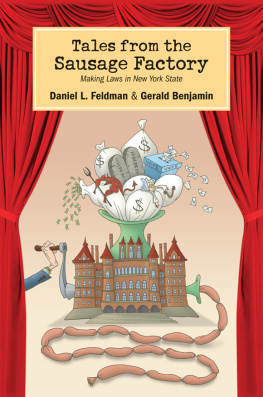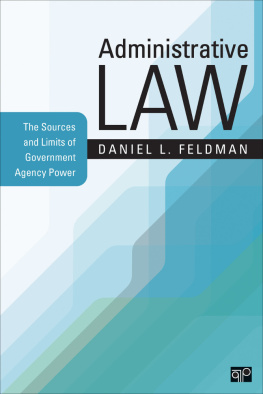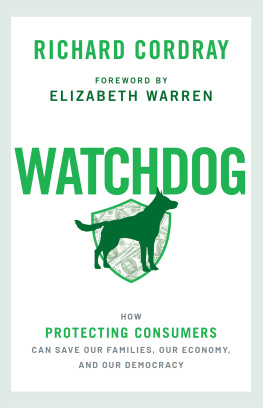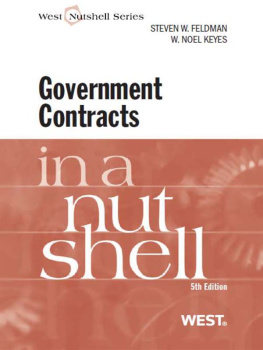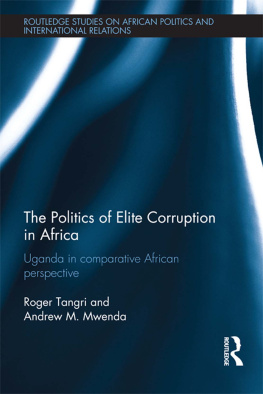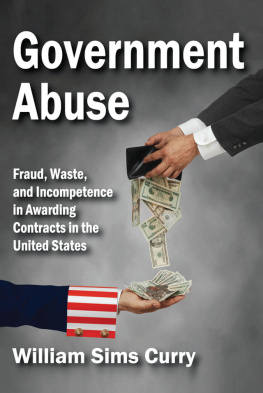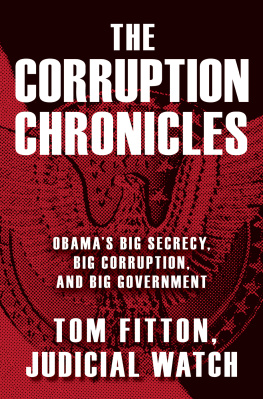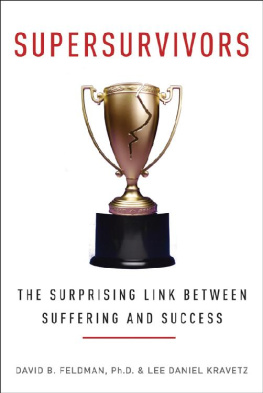Cover photo DNY59 / iStockphoto.com
Published by State University of New York Press, Albany
2013 Daniel L. Feldman and David R. Eichenthal
All rights reserved
Printed in the United States of America
No part of this book may be used or reproduced in any manner whatsoever without written permission. No part of this book may be stored in a retrieval system or transmitted in any form or by any means including electronic, electrostatic, magnetic tape, mechanical, photocopying, recording, or otherwise without the prior permission in writing of the publisher.
Excelsior Editions is an imprint of State University of New York Press
For information, contact State University of New York Press, Albany, NY www.sunypress.edu
Production by Diane Ganeles
Marketing by Fran Keneston
Library of Congress Cataloging-in-Publication Data
Feldman, Daniel L.
The art of the watchdog : fighting fraud, waste, abuse, and corruption in government / Daniel L. Feldman and David R. Eichenthal.
pages cm. (Excelsior editions)
Includes bibliographical references and index.
ISBN 978-1-4384-4929-6 (hardcover : alk. paper)
1. Political corruptionUnited StatesPrevention. 2. Misconduct in officeUnited StatesPrevention. 3. Waste in government spendingUnited StatesPrevention. 4. Legislative oversightUnited States. 5. Public interest groupsUnited States. I. Eichenthal, David R. II. Title.
JF1081.F45 2014
364.1'323dc23 | 2013002460 |
10 9 8 7 6 5 4 3 2 1
Acknowledgments
This book would not exist but for David Eichenthal. Even among the hundreds of fine public servants I have known, David stood out for his profound intelligence and integrity. For more than thirty years I have had the honor of calling him my dear friend. On the basis of his very kind estimation of a book I wrote not long after we first met, he thought an updated version would be warranted. I was smart enough to insist that he co-author it, and lucky enough to get him to agree. As a result, it reflects the vast experience and insight he acquired in those intervening decades. His contributions elevate it to an altogether higher league than that of its predecessor.
My academic home during the writing of this book has been John Jay College of Criminal Justice of the City University of New York, as I hope it will continue to be for many years to come, and a very fine home it is. For that I am deeply grateful to its president, Jeremy Travis, and to my Public Management Department chair, Ned Benton, each of whom has provided wonderful support and guidance. Fred Palm, recently retired as a member of our department, Jay Hamilton, chair of our Economics Department, and Frank Anechiarico, who visited as a professor with us from his permanent academic home at Hamilton College, each read through an earlier version of the manuscript and provided immensely valuable suggestions.
Some of our own experiences in fighting fraud, waste, abuse, and corruption in government enrich this book, and enhance its value to fellow practitioners, scholars, and general readers. Some noteworthy figures to whom I remain grateful gave me the platforms that enabled me to do such work. First and foremost, as is clearly reflected in the pages of this book, is Elizabeth Holtzman. Other than to say that she remains the ultimate role model for oversight professionals, I wont reiterate here the many debts we owe her: just check the index. A young member of the New York State Legislature hired me next to continue that kind of work, and whatever frictions may have colored our relationship thereafter, I must credit the current senior senator for the State of New York, Chuck Schumer, for that. The people of the 45th Assembly District of New York State gave me my next job, succeeding Mr. Schumer, and six years later the then-Speaker of that Assembly, Mel Miller, elevated me to chair of its Committee on Correction, significantly expanding and reinforcing my oversight powers for twelve more years. After the public in its wisdom chose Anthony Weiner over me to represent our district in Congress, then-Attorney General and now my friend Eliot Spitzer chose me to direct the Legal Policy and Program Development unit in New Yorks Law Department, once again empowering me to pursue challenging, fascinating oversight targets for six years. After a two-year stint running a trade association representing a genre of attorneys who themselves engage in an important form of private-sector oversight, my friend Tom DiNapoli, the comptroller of the State of New York, appointed me as Special Counsel. From that vantage point I engaged in other kinds of oversight for three years, until I left for full-time academic work at John Jay.
I incorporate by reference the thanks I have given individually to family and friends in my other books. Please do not take this amiss; I do occasionally need to spare other readers.
My final and greatest acknowledgment is to the United Statesin the words of Carl Schurz on the floor of the U.S. Senate in 1872, My country, right or wrong: if right, to be kept right; and if wrong, to be set right.
Dan Feldman
I often tell students, interns, and others starting out in a career in public service that it really helps to have good people to work with and for and mentors and friends and, now, co-authors.
More than thirty years ago, I was introduced to a young legislative aide who was running for the New York State Assembly. His name was Dan Feldman. Dan won election to the legislature and eventually hired me, first as an intern and then as a staff member. He has been a great friend and colleague ever since. His 1981 book, Reforming Government, was an engaging and thoughtful take on the work of oversight that made me want to pursue it as a career. Thirty years later, after Dans book on his time in the New York legislature was published, I told him that he really should update Reforming Government. His challenge to me was, Ill do it, but only if you co-author it. My greatest hope is that there will be someone who reads The Art of the Watchdog and feels the same way about the important work of oversight that I did after reading Reforming Government.
During my first year of law school, I walked into a seminar on the criminal justice system led by Professor Jim Jacobs. Jim has been a friend, mentor and prod ever since. His workalong with Frank Anechiaricoson The Pursuit of Absolute Integrity was incredibly thought provoking for me, both as a practitioner anddare I saynow as a scholar. Jim was gracious enough to allow me to have an academic hook on which to hang my hat while writing this book as a senior fellow at the Center for Research in Crime and Justice. He also provided an appropriately tough critique of an early draft that I know made the final version immensely better.
After law school, I was fortunate to spend time at the Vera Institute of Justice, working at the Prosecuting Attorneys Research Council led by Dan Johnston. As discussed in the chapter on oversight of police misconduct, Dan greatly informed my thinking on that area. He was also the first person to tell me that sometimes you can judge a person by their enemiesimportant words to live by when you are in the oversight business.

